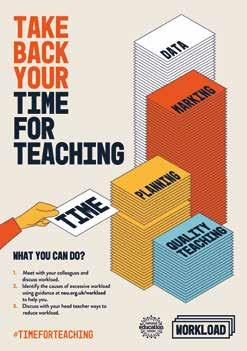
9 minute read
Workload revolution
THE Northern Education Trust (NET) has 21 schools across the north of England, all rated Good or Outstanding.
Like all academy chains, the major issue for staff was an overwhelming workload, and the resulting stress.
Last year, NEU research found that two-fifths of teachers, teaching assistants and school leaders plan to quit by 2024, with 62 per cent blaming “out of control” workload pressures. But in NET schools, some radical changes have been implemented, drastically reducing workload.
Performance-related pay, retrospective marking and lesson observations have been abandoned. This has not only improved teachers’ lives, but also their schools’ results.
Educate magazine was invited to hear from the NEU rep who negotiated the new approach, and the teachers, vice principal and CEO who are enjoying its results.
Michael Mannion (right), computing teacher
MICHAEL has been teaching computing at Thorp Academy for 15 years and for the last five or six years has been the NEU rep.
He used to be bombarded with emails from members. “The issue was usually around workload. I can quite safely say that I have very, very few emails these days asking for support around workload or stress. There’s been a complete change.”
A couple of years ago Michael called a whole school meeting for NEU members to voice their concerns, and they agreed to do a survey of workload problems. The results were “quite frightening,” he says.
“The amount of time spent working outside of school just to get by was unbelievable. They didn’t have a work-life balance. They were coming into school the next day and doing the job exhausted and couldn’t do it well.”
Michael took the results to the school leadership, and workload became a standing item in regular consultation meetings. After a while, the chief executive came back with proposals around feedback and appraisals.
“Staff aren’t absolutely shattered any more. They’ve got the energy to deliver good lessons, because they haven’t been up until 11pm prepping for a lesson observation or marking.” The new appraisal system removing performance-related pay is key. “You can feel the difference in the atmosphere – people don’t feel under as much pressure anymore. They feel trusted as professionals to do their job.
“That’s a culture change – it’s a positive culture and it’s making a big impact.”
Michael recently repeated his workload survey. “There was a big change in the data. People were saying, ‘I have a much better work-life balance. I am delivering better lessons as a result.’”
A positive relationship with management is really important, says Michael. “One of the key things is that if you’ve got a rep in the school it can avoid escalation. We are an example of how we can make a difference.”

Jennifer Horsburgh (opposite), geography teacher
JENNIFER loves working as a geography teacher at Thorp.
“Live marking has made a huge difference to everyday teaching practice. We don’t take any books home to mark. It’s given me so much more time to focus on other things, which benefits the students significantly as well.”
Since lesson observations were abandoned, Jen no longer experiences “the anxiety of having someone come into the room. Even if it’s my head of department, who I work with very well – it still gives you anxiety that someone’s judging your lesson. You just feel less pressure.”
Jen thinks automatic pay progression is great too.
“You’ve been given trust – you’re a professional, you’re a qualified teacher. You do your job well day in, day out, you’re going to get your pay increase. And that really means you can focus on other things, rather than any anxiety about getting it or not. It’s just a relief. To other NEU members with workload issues, Jen says: “Push it with your union in your school [or college].
“It’s taken a while to get here at this school, and I think Michael’s done a lot of the pushing forward. Keep voicing your opinions.” continued on pages 28 & 29


Kay Blackman (above), French & German teacher
IT’S not often you talk to a teacher who was out the night before. But Thorp languages teacher Kay is happy to tell Educate how she’s reclaimed her social life.
“When you had to take books home and look through every single one and mark every page, I found it wasn’t very effective in enabling students to progress.
“I was spending hours writing – sometimes more than what the students had written – for them to look at it in the lesson, and still not really understand what I was trying to get them achieve.
“With live marking, it gives me the opportunity in the class to explain where they’ve gone wrong, to talk them through it. Sometimes just questioning them will help them to think where they’ve gone wrong. “I’m no longer having to mark every night, so it’s given me more time to invest in planning lessons and making them more effective and exciting.
“And it’s given me more of a social life.” Kay was at a quiz the night before we spoke. “Normally, I couldn’t plan my social life because I was always having to mark.”
Since lesson observations have been dropped, Kay feels “a lot more content in teaching. Being observed was quite stressful. Now, I feel a lot more relaxed, more accepted. I know what I’m doing and I’m not just putting on a show for one lesson.”
Kay suggests other education professionals with workload issues discuss live marking with colleagues.
“Being observed was quite stressful. Now, I feel a lot more relaxed, more accepted. I know what I’m doing and I’m not just putting on a show for one lesson.” Kay Blackman, French & German teacher, Thorp Academy
Alex Forsyth (above), vice principal
ALEX is vice principal at NET’s Dyke House Academy. For Alex, developing the new live marking policy “grew out of frustration” for her colleagues.
“They were spending a lot of time outside of their PPA time on a weekend or after school marking books,” she says.
So she researched alternatives and came across the idea of live “feedback”, rather than retrospective marking.
“We looked at pillars of feedback – what we already do in the classroom, like verbal conversations with children.” Trialled in her own school, staff loved it, with one teacher describing it as “up there with the discovery of penicillin”. Children also really liked it, and it was soon rolled out to the entire trust.
“It’s really important to trust professionals in the classroom. Ultimately, we wanted a policy in place that actually just lets teachers teach and students learn,” she says.
“We had an Ofsted in Dyke House and the inspectors were really happy with the policy. They liked the fact that the children made progress. Once you’ve got that written in black and white on an Ofsted report, that alleviated the worries of senior leaders elsewhere.
“People can be scared of changing things. It takes courage to say, ‘there’s got to be a better way’.”
Alex’s message to other schools is: take a risk. “Do you want your staff to spend time planning really outstanding lessons or spend their time marking and writing comments that children might not even read?”
Rob Tarn (below), chief executive
ROB taught for 20 years before becoming chief executive of Northern Education Trust. His business case for these progressive policies was about “challenging things we’ve been doing in education just because they’ve always been done that way”, he tells Educate.
“Teachers are supposed to take home a big bag of books every night. They mark them for hours and hours. They write things like ‘please see me’ and children don’t ever see them. And there isn’t much evidence that it moves their learning on.
“We wanted a sense of abandonment – to try something radical.
“It’s had a huge impact on teacher workload and how teachers can plan better lessons. We’ve had fantastic feedback from children and a rise in standards too.”
Why remove observations? “Observations are an old-fashioned approach. There was a two-week period every year where the whole senior leadership team was tied up with lesson observations. We questioned why we do that – does it improve student outcomes?
“We’ve now abandoned marking and we’ve abandoned lesson observations and we have many of the most improved schools in England over
the last couple of years. The evidence suggests abandonment leads to higher standards.” Why abandon performance-related pay – recruitment and retention? “It’s multifaceted. It’s another example of something that creates a huge administration job. Does it make any difference to the quality of education?
Probably not. “Certainly, my experience of announcing to a group of 22 head teachers that they wouldn’t be doing all that paperwork every autumn term was met with quite a positive response, I have to say.
“We have four of the 20 most improved secondary schools in England for the proportion of students passing maths and English. Our surveys of staff and our feedback from recent Ofsted inspections is our staff feel we care about them and appreciate that we are doing things to improve their workload. “Disadvantaged children at Thorp last year made more progress than nondisadvantaged children nationally.
“We don’t have a monopoly on good ideas, but I would encourage leaders to look into what really has the biggest impact on children’s progress and if there’s something that doesn’t, do away with it.”
Rob also advocates for good industrial relations. “It’s fundamentally important there’s a strong local and national relationship between an employer and the employees’ representatives. Our relationship has been really, really positive.”
Initially, Rob was really nervous about the new feedback policy. “I kick myself now that I didn’t do it ten years ago.”
Resources


n The NEU has resources on tackling workload in your school or college: neu.org.uk/campaigns/workload
schools 360˚

We know how difficult it can be to prioritise your pupils’ mental health So we’ve made it easier for you





By signing up to YoungMinds’ 360° Schools’ Community, you’ll receive free resources, activities and wellbeing tips straight to your inbox.












